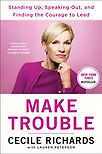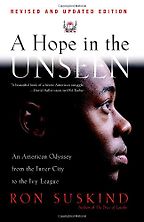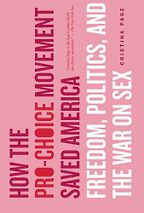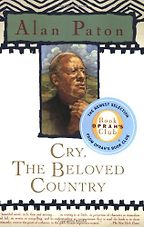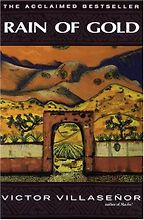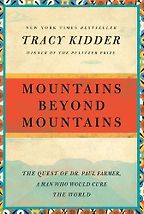What does A Hope in the Unseen say to you about progressivism? Why did you pick this book?
I was interested in the book because my kids were in the DC [District of Columbia] public schools – they actually graduated from the DC public schools. This is an incredible book: It’s about this amazing young kid, Cedric Jennings, who not only graduated from the DC public schools but then goes to Brown University, which is where I went to school. It’s just an extraordinary story. I think it’s good for any progressive to understand the class, social and race issues that he deals with in this book.
I also think it’s important to understand what it takes for a young person coming from a radically different background to integrate into even a progressive university. I’m a huge believer in public education and the need to fight for public education – I think it’s the core democratic institution we have in this country and I think in too many places we’ve abandoned it. The District of Columbia is a good example of where there are good committed folks, but so much still to do.
It’s been interesting, since I read this book, going back to Brown last year and to see the difference with Ruth Simmons, the first African American woman president of an Ivy League institution. I can see the difference in the student body, how it looks, how it has changed. It was tremendous but, again, I just think this book gives you a really good sense of both why we need to do more about public education and what it really takes to help young people who have tremendous potential.
It’s not enough just to get them into a good university and to give them those opportunities, but to think about all the different barriers that exist for them. This kid deals with all of them and goes on to have an incredible life and career.
It’s interesting because so much of the argument between conservatives and progressives is often about the role of the individual and the role of the community in shaping the individual. Did you see it taking a side in that argument?
Well, to me what was so striking about it is his whole experience. When his mom takes the bus up to see him on parents’ weekend, their outing is to the dollar store, whereas all his classmates – their parents are taking them out to the finest restaurants and they have the right clothes and all the trappings of what it means to be in an Ivy League institution.
And I have to say, even for myself. I was from Texas – I had never been out of Texas – so I felt dislocated at Brown just for a whole host of reasons. I didn’t know the language the kids spoke, but you think of this young kid who’s so smart, has fought to get through school in the District of Columbia, and then to get to Brown and be so alienated from everything. It’s mainly about class – it’s about race but it’s mainly about class.
I think there’s a lesson in there for all, and I don’t think it comes out on one side or the other particularly. It’s an important story because it’s way more than just opening a door for a young person – there are often a lot of other obstacles in their way and I think this book does a great job of showing that. I think it also does a great job of showing how important it is to be supporting schools that can provide young people with the background they need to be successful at college and in their career.
Your next book is How the Pro-Choice Movement Saved America. Why did you pick that book and what does it say to you?
I obviously wanted to pick a book that was about the work I do now, and I just think Cristina Page did a great job in this book. It’s a very accessible book and so I’d like to put it in for folks who think this may not be the topic that they know a whole lot about.
I think Cristina really lays out the case that the far right movement in this country, in its fight against abortion rights, is actually against everything that would reduce the need for abortion in America in the first place. She does a great job of chronicling the fight against birth control, the opposition to sex education, the whole campaign against the morning-after pill, and on and on. And, in a very readable way, she outlines this whole anti-science hysteria that unfortunately has now become almost part of urban legend – the allegations that are made on the far right about the perils and the dangers of basic birth control.
“She really lays out the case that the far right movement in this country, in its fight against abortion rights, is actually against everything that would reduce the need for abortion in America in the first place”
Of course, since she wrote this book, which isn’t even that old, we’ve seen the movement in this country go even further. We see most recently the whole effort of Congress to de-fund Planned Parenthood – it’s for family planning. This is really an effort to undermine access not only to legal abortion in America but even legal birth control. She does a good job as well in talking about the whole move by pharmacists to refuse to fill birth-control prescriptions or refuse to fill emergency contraception.
So, again, I think of the cynicism of this movement claiming to be about abortion but being about something much, much more. I also love how she ends it, which is the question: Will the American people stand up for a few energised crusaders hell-bent on imposing their views on how we all ought to live? That is the fundamental question and I think the pro-choice movement or any of the movements for women’s health play a vital role in the progressive community. So I encourage folks to read it.
The issue of reproductive freedom is a core progressive idea, and at its core is an idea of liberty. The author makes clear that what conservative anti-choice crusaders are really trying to do is take away that liberty to control these decisions oneself. It’s often the Tea Party that you hear so much about in terms of individual liberty, but when it comes to abortion that language goes out the window. It seems like at some fundamental point progressives often lose sight of the role of individual freedom and the choice movement and I was wondering if that’s one of the reasons you felt this book might be central.
I’m probably putting my own interpretation on these issues and reading that into this, but to me women don’t get up every morning thinking about their individual freedom. But they do get up every morning thinking about access to healthcare, and for about 30 years of their life they probably want to make sure they don’t get pregnant if they don’t want to. It’s such a fundamental – not even just a rights issue – it’s a health issue, it’s part of women’s lives.
Look, I think Cristina’s point is that the folks that are fighting against Planned Parenthood or folks who are fighting against birth control, they basically don’t believe that people should be having sex except to procreate. That’s a fundamental struggle. If you don’t believe that people are sexual beings and that they should have the ability to live their lives as sexual beings then it’s hard to argue with them about all the issues around birth control. So I think she gets into that a little bit.
I think what she really does is underscore the irony of the fact that you can’t want to end or reduce the number of abortions in America and also do everything you can to keep women and young people from having the information and healthcare they need to prevent unintended pregnancy. Right now, that’s where the anti-choice movement is living.
Your next book is Cry, The Beloved Country.
It’s a novel – I know that was sort of cheating a little bit.
We love novels. It’s great to have different kinds of writing. Why did you choose it?
It’s one of my favourite books – there are very few books I’ve read more than once but this is one. I told my daughter yesterday that I was going to be talking about this book and she said, “I just finished it on the subway and I was so worried that people would see me crying, because it’s an incredibly moving book.”
When I went to college I majored in history but I really kind of minored in agitating. The first big national campaign that I was involved in was getting Brown to divest their investments in South Africa. I missed the [Vietnam] anti-war movement, but for me and for young people who grew up when I did, that was Nelson Mandela, Robben Island. It was the first big national campaign that American students got involved in and of course was ultimately successful.
“When I went to college, I majored in history but I really kind of minored in agitating”
This book has always had a special place in my heart. It’s incredible to think that this book was written back in the 1940s but it has really stood the test of time, and captures the brutality of life in South Africa and also the incredible complexities of this really extraordinary country. I think it deals with issues of culture and race and rural/urban and generational divides in a way that is still true today.
These are still issues that people in South Africa are dealing with and like every great novel it has all the wonderful elements of struggle, tragedy and reconciliation. Even though it’s a very sad book, it’s ultimately a very, very hopeful book. I was actually asking a couple of my friends who are South African where this book is in the current day, and I think people still respect it as an essential novel about how life was.
I was wondering if part of the attraction to you was just the way it depicts tremendous injustice and is that something progressives work on wherever they see it?
Clearly, the whole theme of this is the struggle in South Africa. You look at the two families that play a central role and the divisions – the generational divisions and the racial divisions – and how these people’s lives, despite the divisions, become entwined. This is a country where people are living side by side – even in a divided country – and dealing with many of the same issues.
I just think it’s a very poignant story but of course it is about injustice and the complexity of South Africa today, which is that ending apartheid was the first step on a very long march for true justice and democracy. There is nothing simple in a lot of these countries. You can’t ever solve one problem if there’s another one coming down the road.
Tell us about your next book, Rain of Gold.
This has been a favourite of mine for a while, but it’s definitely off the radar of most people so I also want to highlight it for people who don’t know about it. I think it’s a great book. It’s kind of a semi-autobiographical novel but it’s basically about the migration of Mexican families to the US, families that get to California.
It’s the life of Victor Villaseñor’s family starting back at the time of the Mexican Revolution as the family migrates and comes to the States. They work as miners, they work as farm workers, they do basically everything to survive and so it’s kind of a classic immigrant story. For me, it had a personal connection because I spent a number of years as a union organiser.
Probably the best campaign I was ever involved with was in Los Angeles. It was a Justice for Janitors campaign, where we were organising immigrant janitors who were from Latin America primarily and had the same kind of resilience that you read about in this book – despite all odds, just continuing on. That was really my experience too, in that organising campaign. These are folks who had risked everything to come to the United States and then were willing to risk everything again to organise a union for janitors.
I think we have an enormous responsibility to get the immigration issue right in this country and there’s so much work to do so. It’s probably right up there with the most important issues that we have to deal with as progressives and I think we have not done a good job. I think this book just gives you a good taste of the immigrant experience.
It also, beyond showing the incredible courage and vitality and leadership that immigrants demonstrate to get here, does a beautiful job of illustrating the contribution that the immigrant community has made to culture and arts. Look at Los Angeles and California and the influence of Mexican immigrants. Without them it wouldn’t be the same city, it wouldn’t be the same state, it wouldn’t be the same country, so I love it in that way as well. I think it does an excellent job of talking about that part of the immigrant experience.
Both this and Hope in the Unseen talk about the struggles that various people have to overcome.
They’re both about resilience. You think about Cedric and you think about Villaseñor’s families – these are people who just keep going on. They face unbelievable odds and they just keep going on.
Mountains Beyond Mountains is your last book. Why did you pick this one?
Everyone has to read this book. I guess I just picked it for anyone who hasn’t read it and if you’re a progressive and you’re trying to figure out what to do with your life. Tracy Kidder is a great writer so that doesn’t hurt, but Paul Farmer’s story, the story of one person who decides they want to change the world, is so compelling. I think even for the most cynical, hard-bitten progressive you can’t help but read this book and feel inspired. So it’s a lot of levels.
“I think even for the most cynical, hard-bitten progressive you can’t help but read this book and feel inspired”
Obviously the whole idea is how one person can make a difference, which I think as progressives we have to continue to remind ourselves of. Obviously I’m very interested in his commitment to bring modern healthcare to people who need it – infectious diseases is the area that he focuses on – and his belief that healthcare is a basic human right is incredibly important, and that’s the work I feel like I’m engaged in every day. I love one of the things he says – his philosophy is that the only real nation is humanity.
Again, I think that borders are just artificial divides between people of the world who are all struggling for the same thing. To me it’s a lovely story, it’s an important story, it’s clearly relevant to today. You can talk about what’s going on in terms of groundbreaking work to improve healthcare in this country without thinking about Haiti and without thinking about Paul Farmer, but even apart from that I just think it’s a very inspiring story. I made all my kids read it.
A lot of people have chosen books where there’s that individual who has overcome a lot of challenges, providing inspiration to show that we can actually solve these challenges. Sometimes it’s making a little progress, sometimes it’s making big progress.
Right. I think that’s right and I actually think that’s kind of what Paul believed too. Obviously he’s trying to move huge issues and huge pieces of work but throughout that story there are people who are doing what they can and making a difference where they can. I think there are times where it’s very discouraging because there are huge political movements that you feel are out of your control and so sometimes we do just have to buckle down and ask, “What are the pieces that we can actually influence and how can I make a difference?”
In my dream, every progressive finds something that makes their heart sing, and that’s how they make a difference. Whether it is what Paul Farmer did, whether it’s writing an incredible novel that inspires people, whether it’s fighting for public education, it’s all going to add up to something greater than the sum of the parts. If we don’t believe that, we’re not going to make it.
July 24, 2011. Updated: April 21, 2019
Five Books aims to keep its book recommendations and interviews up to date. If you are the interviewee and would like to update your choice of books (or even just what you say about them) please email us at [email protected]
Five Books interviews are expensive to produce. If you've enjoyed this interview, please support us by donating a small amount.

